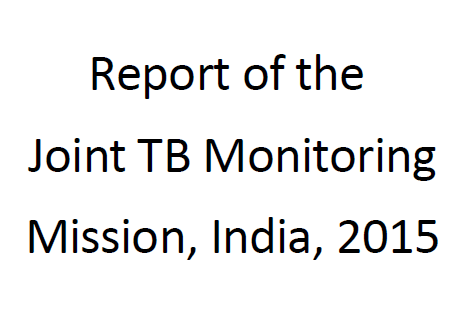Leaked: draft 2015 report on Indian Revised National TB Control Programme from Joint Monitoring Mission
Joint TB Monitoring Mission
July 23, 2015, 8:25 p.m.

Central TB Division (CTD) organised the Joint Monitoring Mission (JMM) in April 2015 along with the World Health Organisation country office to review the functioning of the Revised National TB Control Programme (RNTCP) of India.
In addition to the review of the overall program, the report also carries the assessment of field visits done by members of JMM in selected 7 states. The participants included stakeholders from concerned departments from the government, WHO and local, national and international NGOs involved in treatment and advocacy on TB.
There have been 5 such missions since RNTCP's inception with each mission coming up with elaborate recommendations for the CTD. The previous mission was held in 2012 which led to formation of National Strategic Plan (NSP) 2012-2017. This also became the roadmap for the national TB program to integrate WHO guidelines.
This report is not available on the website of RNTCP for public consultations. Past reports are also not available in the public domain.
Gaps highlighted by JMM report
- The report specifically pointed out that while policy revisions have been done by the RNTCP, the actual implementation of these long overdue changes is being held up for lack of timely decisions, especially at central level (MoH).
- There is also a huge fund deficit in the TB program and in order to reach the ambitious goals set by the program, an additional fund of 750 crores is needed.
- The report also observed that nearly two thirds (66%) of the recommendations made by the JMM 2012 have not been fully implemented.
- At the level of programmatic implementation, RNTCP was criticized for its continued use of thrice weekly intermittent regimen and initiation of treatment without knowing the resistance profile of the patients, which is contributes to the amplification of resistance (DR TB).
- The procurement and supply chain management continue to be a problematic area with delays in procurement of GeneXpert, bad storage conditions and limited capacity of states on procurement in case of emergencies. The report specifically mentions the 10 month stock outs of GeneXpert cartridges in Andhra Pradesh.
- For people having HIV-TB co-infection, integration of HIV-TB departments is still very slow.
- Daily anti-tuberculosis treatment and initiation of Isoniazid Preventive Therapy (IPT) for PLHIV has not started yet. GeneXpert is still not being used as the initial diagnostic tool for PLHIVs.
- The lack of engagement of the program to collaborate with the massive private sector, that is the first point of contact with healthcare for almost 70% of the TB patients, is still a huge gap.
The report gives extensive recommendations for each section under TB program including surveillance, diagnosis, treatment, supply chain management, social and economic support, community engagement and R&D. Given below are the overall recommendations.
- A significant increase in the government funding for TB control in order to meet the targets of the NSP and achieve the goals of the END TB Strategy. RNTCP will need 1500 crores/yr to achieve the goals of the NSP and additional 750 crores annually will be needed to achieve the goals of the End TB strategy.
- All patients receive care based on the 'Standards for TB Care in India' – which include transition to daily regimen using FDCs, improved access to rapid molecular diagnostics, economic, social and nutritional support to TB patients, increased community engagement in planning and implementation, accelerate response to childhood TB and TB/HIV, targeted interventions for special groups.
- Ministry of Health to ensure that private sector TB patients receive early TB detection, appropriate treatment, sustained adherence support and a reduction of their out of pocket expenditure – which would include scaling up access to free drugs and diagnostics to reduce out of pocket expenditure, scale up successful models of adherence support and monitoring, measuring and improving quality of care of private providers and extending public health services to privately notified TB patients.
- Ministry of Health to form a TB Research Consortium for better understanding of the size and trend of the TB burden and to pioneer a national TB research strategy with a country specific prioritised research agenda.
- Need for a high level sustained national campaign on TB: "TB Free India/TB Mukt Bharat" at national, state, local self-governments in coordination with the private sector, NGOs, media, etc.
To download the report, click here.
